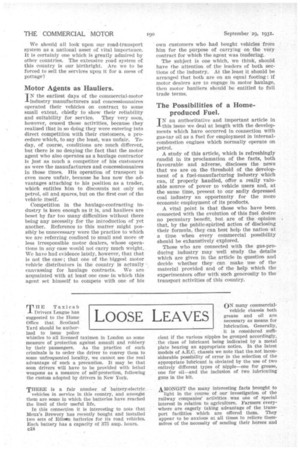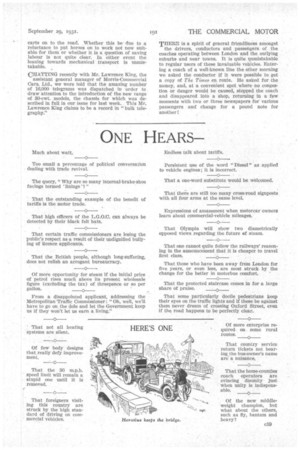frIHE Taxicab Drivers League has suggested to the Home Office
Page 40

Page 41

If you've noticed an error in this article please click here to report it so we can fix it.
that Scotland Yard should be authorized to issue police whistles to all licensed taximen in London as some measure of protection against assault and robbery by their passengers. As the practice of such criminals is to order the driver to convey them to some unfrequented locality, we cannot see the real advantage of such a precaution. It may be that soon drivers will have to be provided with lethal weapons as a measure of self-protection, following the custom adopted by drivers in New York.
THERE is a fair number of battery-electric vehicles in service in this country, and amongst them are some in which the batteries have reached the limit of their useful life.
In this connection it is interesting to note that Meux's Brewery has recently bought and installed two sets of Edima batteries for its road vehicles. Each battery has a capacity of 375 amp. hours. ON many commercial vehicle chassis both grease and oil are necessary as means for lubrication. Generally, it is considered sufti cient if the various nipples be grouped accordingly, • the class of lubricant being indicated by a metal plate bearing an appropriate notice. In the latest models of A.E.C. chassis we note that the not inconsiderable possibility of error in the selection of the appropriate lubricant is obviated by the use of two entirely different types of nipple—one for grease, one for oil—and the inclusion of two lubricating guns in the kit.
AMONGST the many interesting facts brought to light in the course of our investigation of the railway companies' activities was one of special interest in relation to agriculture. Farmers everywhere are eagerly taking advantage of the transport facilities which are offered them. They appear to be anxious at all times to relieve themselves of the necessity of sending their horses and carts on to the road. Whether this be due to a reluctance to put horses on to work not now suitable for them or whether it is a question of saving labour is not quite clear. In either event the leaning towards mechanical transport is unmistakable.
CHATTING recently with Mr. Lawrence King, the assistant general manager of Morris-Commercial Cars, Ltd., we were told that the amazing number of 16000 telegrams was dispatched in order to draw attention to the introduction of the new range a 30-cwt. models, the chassis for which was described in full in our issue for last week. This Mr. Lawrence King claims to be a record in "bulk telegraphy." THERE is a spirit of general friendliness amongst the drivers, conductors and passengers of the coaches operating between London and the outlying suburbs and near towns. It is quite unmistakable to regular users of these invaluable vehicles. Entering a coach of a well-known line the other morning we asked the conductor if it were possible to get a copy of The Timeg en route. He asked for the money, and, at a convenient spot where no congestion or danger would be caused, stopped the coach and disappeared into a shop, returning in a few moments with two or three newspapers for various passengers and change for a pound note for another!












































































































